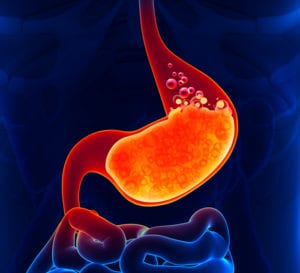Medical Compass: Proton pump inhibitors – Use with caution
Overuse may lead to serious side effects
By David Dunaief, M.D.

Reflux (GERD) disease, sometimes referred to as heartburn, though this is more of a symptom, is one of the most commonly treated diseases. Continuing with that theme, proton pump inhibitors (PPIs), which have become household names, are one of the top-10 drug classes prescribed or taken in the United States. In fact, Centers for Disease Control and Prevention data shows that use has grown precipitously in the 10 years ending in 2010 for those ages 55 to 64, from 9 percent of the population to 16 percent (1). This is a 78 percent increase in the number of prescriptions for these drugs.
In 2010, there were 147 million prescriptions filled for PPIs (2). The class of drugs includes Prevacid (lansoprazole), Prilosec (omeprazole), Nexium (esomeprazole), Protonix (pantoprazole) and Aciphex (rabeprazole). This growth may not capture the fact that several of these medications are now available over the counter.
I remember when PPIs were touted as having one of the cleanest side effect profiles. This may still be true, if we are using them correctly for reflux disease. They are supposed to be used for the short term. This can range from 7 to 14 days for over-the-counter PPIs to 4 to 8 weeks for prescription PPIs.
Why did we not know that this class of drugs might be associated with chronic kidney disease, dementia, bone fractures and Clostridium difficile (a bacterial infection of the gastrointestinal tract) before they were approved? Well, if you look at the manufacturers’ package inserts for these drugs, the trials, such as for Protonix, were no longer than a year (3), yet we are putting patients on these medications for decades. And the longer people are on them, the more complications arise.
Typical symptoms of reflux are heartburn and/or regurgitation. Atypical symptoms include coughing and throat clearing. But these atypical symptoms may not be as common as you might think. In fact, in one study, coughing and throat clearing taken together only resulted in a very small portion of patients having reflux disease (4). Having one of these two symptoms showed a slightly higher risk of reflux, but very modest.
Let’s look at some of the research.
Though PPIs may increase the risk of a number of complications, keep in mind that none of the data are from randomized controlled trials (RCTs), which are the gold standard of studies, but mostly observational studies that suggest an association, but not a link. Long-term RCTs to determine side effects are prohibitively expensive.
PPI and kidney disease

In two separate studies, results showed that there was an increase in chronic kidney disease with prolonged PPI use (5). All of the patients started the study with normal kidney function based on glomerular filtration rate (GFR). In the Atherosclerosis Risk in Communities (ARIC) study, there was a 50 percent increased risk of chronic kidney disease, while the Geisinger Health System cohort study found there was a modest 17 percent increased risk. The first study had a 13-year duration, and the second had about a six-year duration. Both demonstrated a modest, but statistically significant, increased risk of chronic kidney disease.
But as you can see, the medications were used on a chronic basis for years. In an accompanying editorial to these published studies, the author suggests that there is overuse of the medications or that they are used beyond the resolution of symptoms and suggests starting with diet and lifestyle modifications as well as a milder drug class, H2 blockers (6).
PPI and bone fractures
In a meta-analysis (a group of 18 observational studies), results showed that PPIs can increase the risk of hip fractures, spine fractures and any-site fractures (8). Interestingly, when it came to bone fractures, it did not make a difference whether patients were taking PPIs for more or less than a year. How much less than a year was not delineated. They found increased fracture risks of 58, 26 and 33 percent for spine, hip and any site, respectively. It is not clear what may potentially increase the risk; however, it has been proposed that it may have to do with calcium absorption through the gut.
PPIs reduce the amount of acid, which may be needed to absorb insoluble calcium salts. In another study, seven days of PPIs were shown to lower the absorption of calcium carbonate supplements when taken without food (9).
PPI and dementia

A German study looked at health records from a large public insurer and found there was a 44 percent increased risk of dementia in the elderly who were using PPIs, compared to those who were not (7). These patients were at least age 75. The authors surmise that PPIs may cross the coveted blood-brain barrier and have effects by potentially increasing beta-amyloid levels, markers for dementia. With occasional use, meaning once every 18 months for a few weeks to a few months, there was a much lower increased risk of 16 percent.
The researchers also suggested that PPIs may be significantly overprescribed in the elderly. Unfortunately, there were confounding factors that may have conflated the risk, such as multiple drug use, having diabetes, or patient also having depression or a stroke history. Researchers also did not take into account family history of dementia, high blood pressure or excessive alcohol use, all of which have effects on dementia occurrence.
Need for magnesium
PPIs may have lower absorption effects on several electrolytes including magnesium, calcium and B12. In one observational study, PPIs combined with diuretics caused a 73 percent increased risk of hospitalization due to low magnesium (10). Diuretics are water pills that are commonly used in disorders such as high blood pressure, heart failure and swelling.
Another study confirmed these results. In this second study, which was a meta-analysis (a group of nine studies), PPIs increased the risk of low magnesium in patients by 43 percent, and when researchers looked only at higher quality studies, the risk increased to 63 percent (11). The authors note that a significant reduction in magnesium could lead to cardiovascular events.
The bottom line is even though some PPIs are over-the-counter and some are prescription medications, it is best if you confer with your doctor before starting them. You may not need PPIs, but rather a milder medication referred to as H2 blockers (Zantac, Pepcid). Even better, start with lifestyle modifications including diet, not eating later at night, raising the head of the bed, losing weight and stopping smoking, if needed, and then consider medications (12). If you do need medications, know that PPIs don’t give immediate relief and should only be taken for a short duration: 7 to 14 days, according to the FDA (13), without a doctor’s consult, and 4 to 8 weeks with one. Most of the problems occur with long-term use.
References:
(1) cdc.gov. (2) PLoS Med. 2014;11(9):e1001736. (3) protonix.com. (4) J Clin Gastroenterol. Online Jul 18, 2015. (5) JAMA Intern Med. 2016;176(2). (6) JAMA Intern Med. 2016;176(2):172-174. (7) JAMA Neurol. online Feb 15, 2016. (8) Osteoporos Int. online Oct 13, 2015. (9) Am J Med. 118:778-781. (10) PLoS Med. 2014;11(9):e1001736. (11) Ren Fail. 2015;37(7):1237-1241. (12) Am J Gastroenterol 2015; 110:393–400. (13) fda.gov.
Dr. Dunaief is a speaker, author and local lifestyle medicine physician focusing on the integration of medicine, nutrition, fitness and stress management. For further information, visit www.medicalcompassmd.com or consult your personal physician.







